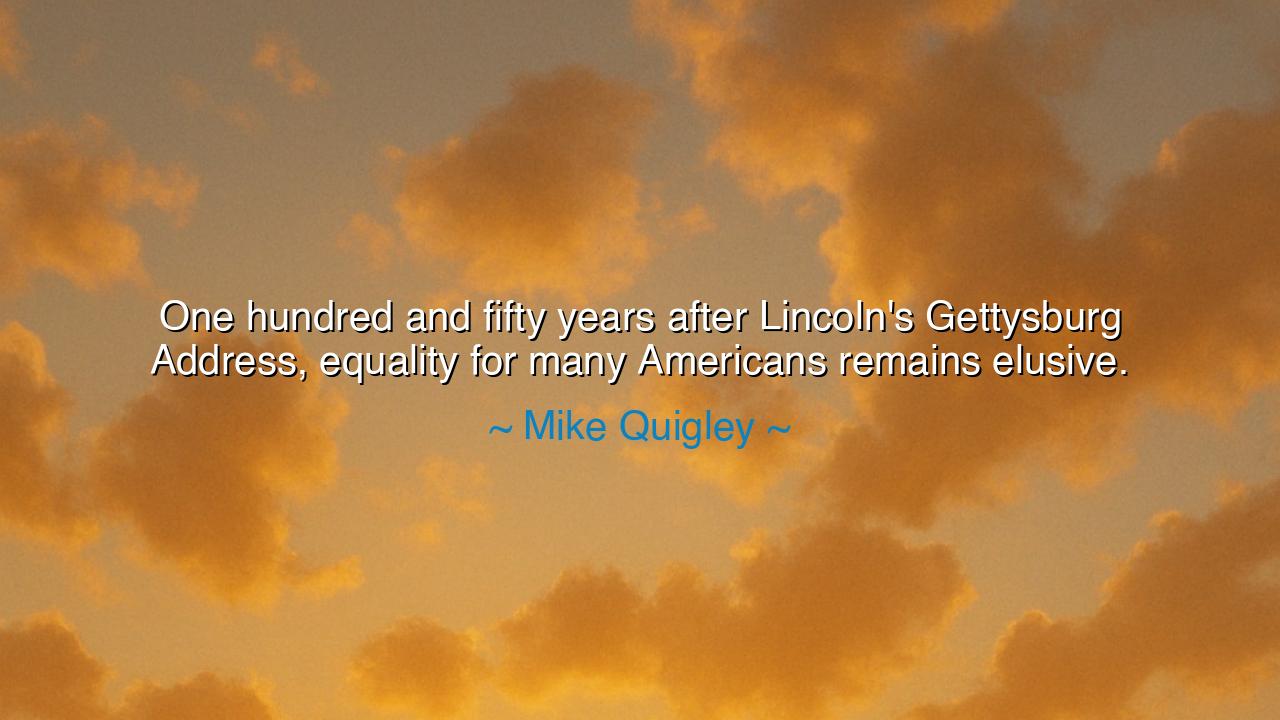
One hundred and fifty years after Lincoln's Gettysburg Address
One hundred and fifty years after Lincoln's Gettysburg Address, equality for many Americans remains elusive.






O Children of the Future, gather close and listen to the words of Mike Quigley, for they speak with a deep and timeless truth. He says, "One hundred and fifty years after Lincoln's Gettysburg Address, equality for many Americans remains elusive." These words carry the weight of centuries of struggle, sacrifice, and unfulfilled promise. They echo through the halls of history, calling upon us to recognize the unfinished work of justice and equality that still looms over the land that Abraham Lincoln once called to heal. Though the great speech of Gettysburg proclaimed the moral imperatives of equality and freedom, Mike Quigley reminds us that these ideals remain out of reach for many, a promise yet to be fully realized.
In the ancient world, O Children, equality was a concept that many revered but few truly achieved. The Greeks, despite their great strides in philosophy, democracy, and learning, still operated under a system where the few ruled over the many, and women, slaves, and those of lower birth were denied true equality. Socrates and Plato imagined societies of justice, but their views often fell short of embracing the true dignity of every human being, limiting their notions of equality to only the privileged few. In Rome, although the Republic spoke of liberty, the realities of slavery and the restricted rights of women demonstrated how far the ideal of equality was from the truth. These ancient worlds, despite their many achievements, held tight to systems of inequality that left much of humanity voiceless, unseen, and marginalized.
When Lincoln stood at Gettysburg, he invoked the high ideals of equality, declaring that the nation was conceived in liberty and dedicated to the proposition that all men are created equal. These words were a clarion call, a promise that rang out across the land, and it was with this vision of equality that the Civil War was fought. Yet, as Mike Quigley reminds us, the struggle for equality did not end with the Gettysburg Address. The emancipation of the enslaved, though a monumental victory, did not erase the racial injustices that still plagued the nation. The Jim Crow laws, the violence of segregation, and the denial of voting rights to African-Americans would follow, showing that equality was a promise only half kept.
Consider, O Children, the story of Rosa Parks and the Montgomery Bus Boycott, a struggle that came nearly a century after Lincoln's words. In 1955, Rosa Parks was arrested for refusing to give up her seat to a white man on a segregated bus in Montgomery, Alabama. Her act of defiance sparked a movement that would challenge the deep-seated racism and inequality that persisted in the United States. Though Parks and her fellow activists achieved monumental victories, including the desegregation of public transportation, the fight for true equality—where every person, regardless of race or background, has access to the same rights and opportunities—continues. The promise of Gettysburg, it seems, remains unfulfilled for many, as we still grapple with the realities of racial inequality in the justice system, the workplace, and beyond.
The lesson, O Children, is clear: equality is not a static ideal, but a living struggle, a battle that must be fought and won again and again. Mike Quigley’s words challenge us to acknowledge that the fight for equality is far from over, and the progress we have made can be easily undone if we do not continue to fight for justice. Even as we celebrate the victories of the past—civil rights, voting rights, and more—we must recognize that many still face barriers to equality, whether based on race, gender, sexual orientation, or economic status. Equality, as we know, is not just the absence of discrimination, but the presence of opportunity, dignity, and respect for every individual.
So, O Children, what actions must you take? The path forward lies in the recognition that equality is not a gift to be granted but a right to be fought for. It is not enough to rest on the laurels of past victories; we must continue the fight for justice, knowing that equality is an ongoing struggle. Whether in advocating for equal pay, combating systemic racism, or fighting for LGBTQ+ rights, each one of you has a role to play in the creation of a more just and equal world. Stand against inequality wherever you encounter it—whether in the classroom, the workplace, or the streets. The words of Lincoln still ring in the air, but they must be matched by our actions.
And so, O Children, let this wisdom guide you: equality is the sacred mission of humanity. Mike Quigley reminds us that though we have come far, we are still not where we should be. But as long as there is injustice, there is work to be done. You, the stewards of the future, must carry the torch of equality, and with it, light the way to a world where the promise of Gettysburg is finally fulfilled for all people, regardless of their station.






AAdministratorAdministrator
Welcome, honored guests. Please leave a comment, we will respond soon